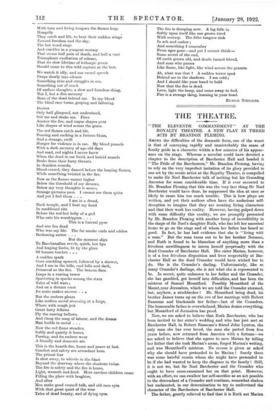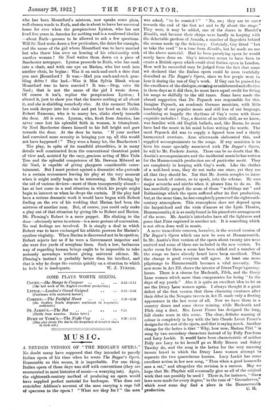THE THEATRE.
" THE ELEVENTH COMMANDMENT " AT THE ROYALTY THEATRE. A NEW PLAY IN THREE ACTS BY BRANDON FLEMMG.
AMONG the difficulties of the dramatic form, one of the worst is that of conveying rapidly and unmistakably the sense of family pride in a character within a few minutes of his appear- ance on the stage. Whereas a novelist could have devoted a chapter to the description of .Barchester Hall and headed it " The Pride of the Barchesters," Mr. Brandon Fleming, having to rely on the very imperfect imitation of its glory provided in one set by the scenic artist at the Royalty Theatre, is compelled to make Sir Noel Barchester talk of nothing but his Crusading Ancestor for some considerable time. If it ever occurred to Mr. Brandon Fleming that this was the very last thing Sir Noel Barchester would have done, he suppz:essed the idea at once as likely to cause him too much trouble. This is how plays are written, and yet their authors often have the audacious self- deception to imagine that they are creating living characters and that their work has reality. However, having gulped down with some difficulty this crudity, we are promptly presented by Mr. Brandon Fleming with another lump of incredibility in the shape of Sir Noel's daughter Ruth, who has left her ancestral home to go on the stage and of whom her father has heard nc good. In fact, he has had evidence that she is " living with a man." But the man turns out to be her brother Norman, and Ruth is found to be blameless of anything more than a frivolous unwillingness to intern herself perpetually with the dead Crusader of Barchester Hall. Her sister Marian, however, is of a less frivolous disposition and lives respectably at Bar- cheater Hall as the dead Crusader would have wished her to do. She is the Crusader's darling. Unfortimately, like se many Crusader's darlings, she is not what she is represented to be. In secret, quite unknown to her father and the Crusader, she has gambled, got herself into difficulties, and has been the mistress of Samuel Mountford. Possibly Mountford of the Mount, near Jerusalem, which we are told the Crusader stormed, but, anyhow, a stockbroker ! Mr. Mountford being dead, his brother James turns up on the eve of her marriage with Robert Ransome and blackmails her father—last of the Crusaders. The honourable father is overwhelmed, Marian denies everything, but Mountford of Jerusalem has proof.
Now, we are asked to believe that Ruth Barchester, who has been invited to her sister's wedding •and who has just met at Barchester Hall, in Robert Ransome's friend John Lynton, the only man she has ever loved, the man she parted from five years before, now returned from America with a fortune—we are asked to believe that she agrees to save Marian by telling her father that she took Marian's name, forged Marian's writing, and was Mountford's mistress. No reason is given or asked why she should have pretended to be Marian ! Surely there was some hateful cousin whom she might have pretended to be if she had wanted to keep the disgrace in the family ! Still, it is not we, but Sir Noel Barchester and the Crusader who ought to have cross-examined her on that point. However, with an effort, we can swallow her self-sacrifice as an act possible to the descendant of a Crusader and continue, somewhat shaken but undaunted, in our determination to try to understand the
character of the Barchesters of Barchester Hall. - The father, greatly relieved to find that it is Ruth not Marian
who has been Mountford's mistress, now speaks some plain, well-chosen words to Ruth, and she is about to leave her ancestral home for ever when the perspicacious Lynton, who has not lived five years in America for nothing and is a confirmed idealist —about Ruth—presses to be allowed to ask a few questions. Will Si Noel write down a few particulars, the dates for example, and the name of the girl whom Mountford was to have married but who threw him over on hearing of his relationship with another woman ? Sir Noel writes them down on a piece of Barchester notepaper. Lynton proceeds to Ruth, who has sunk into a chair, and with one eye on Marian, who has sunk into another chair, he begins ; Was it on such-and-such a date that you met Mound ord ? It was.—Had you such-and-such gam- bling debts ? She had.—Was it Miss Sylvia Blank whom Mountford was to have married ? It was.—Stop, cries Sir Noel ; that is not the name of the girl I wrote down. Of course it isn't, replies the perspicacious Lynton ; I altered it, just to show you that she knows nothing at all about it, and she is shielding somebody else. At this moment Marian has sunk deeper into her chair and put her head on the table. Robert Ransome, who is to marry her, slinks slowly towards the door. All is over. Lynton, who, fresh from America, has never once lest his splendid faith in woman, is triumphant. Sir Noel Barchester draws himself to his full height and goes towards the door. At the door he turns. " If your mother had exercised more severity in bringing you up, all this would not have happened ! " They were a funny lot, the Barchesters !
The play, in spite of its manifold absurdities, is in many details well constructed from the conventional theatrical point of view and, assisted by the easy, gracious acting of Miss Viola Tree and the splendid competence of Mr. Dawson Milward as Sir Noel, is capable of giving playgoers considerable enter- tainment. But I must protest against a dramatist who pretends to a certain seriousness leaving his play at the very moment when it might really begin to be interesting. Mr. Fleming, by the aid of various devices—most of them transparently absurd— has at last come to a real situation in which his people might begin to interest us when he drops the curtain. If the play had been a serious dramatic work it would have begun with Robert finding on the eve of his wedding that Marian had been the mistress of another man. But, of course, you could only make a play out of that situation by giving life to Robert and Marian. Mr. Fleming's Robert is a mere puppet. His slinking to the door—obviously never to return—is a mere gesture of convention. No real feelings are involved. It is simply a deal in which Robert was to have exchanged his athletic prowess for Marian's spotless virginity. When Marian is discovered not to be spotless, Robert rejects her as if he were a Government inspector and she were five yards of aeroplane linen. Such a low, barbarous way of regarding human beings ought to be impossible to take seriously nowadays without giving universal offence. Mr. Fleming's instinct is probably better than his intellect, and that is why he drops the curtain quickly on a situation to which



































 Previous page
Previous page